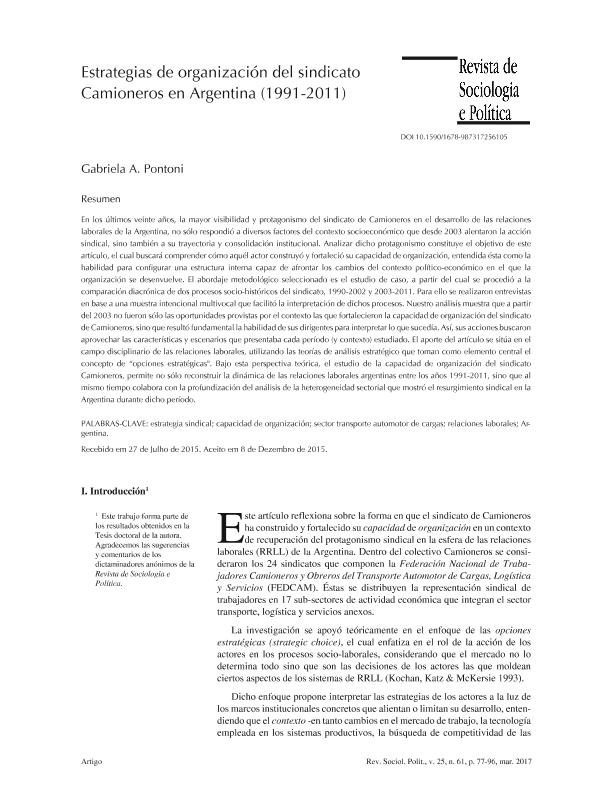Mostrar el registro sencillo del ítem
dc.contributor.author
Pontoni, Gabriela Alejandra

dc.coverage.spatial
Argentina
dc.date.available
2018-01-24T20:49:39Z
dc.date.issued
2017-03
dc.identifier.citation
Pontoni, Gabriela Alejandra; Estrategias de organización del sindicato Camioneros (1991-2011); Universidade Federal do Paraná; Revista de Sociologia e Política; 25; 61; 3-2017; 77-96
dc.identifier.issn
0104-4478
dc.identifier.uri
http://hdl.handle.net/11336/34508
dc.description.abstract
En los últimos veinte años, la mayor visibilidad y protagonismo del sindicato de Camioneros en el desarrollo de las relaciones laborales de la Argentina, no sólo respondió a diversos factores del contexto socioeconómico que desde 2003 alentaron la acción sindical, sino también a su trayectoria y consolidación institucional. Analizar dicho protagonismo constituye el objetivo de este artículo, el cual buscará comprender cómo aquél actor construyó y fortaleció su capacidad de organización, entendida ésta como la habilidad para configurar una estructura interna capaz de afrontar los cambios del contexto político-económico en el que la organización se desenvuelve. El abordaje metodológico seleccionado es el estudio de caso, a partir del cual se procedió a la comparación diacrónica de dos procesos socio-históricos del sindicato, 1990-2002 y 2003-2011. Para ello se realizaron entrevistas en base a una muestra intencional multivocal que facilitó la interpretación de dichos procesos. Nuestro análisis muestra que a partir del 2003 no fueron sólo las oportunidades provistas por el contexto las que fortalecieron la capacidad de organización del sindicato de Camioneros, sino que resultó fundamental la habilidad de sus dirigentes para interpretar lo que sucedía. Así, sus acciones buscaron aprovechar las características y escenarios que presentaba cada período (y contexto) estudiado. El aporte del artículo se sitúa en el campo disciplinario de las relaciones laborales, utilizando las teorías de análisis estratégico que toman como elemento central el concepto de “opciones estratégicas". Bajo esta perspectiva teórica, el estudio de la capacidad de organización del sindicato Camioneros, permite no sólo reconstruir la dinámica de las relaciones laborales argentinas entre los años 1991-2011, sino que al mismo tiempo colabora con la profundización del análisis de la heterogeneidad sectorial que mostró el resurgimiento sindical en la Argentina durante dicho período.
dc.description.abstract
In the last twenty years, the greater visibility and relevance that the trade union of Truck Drivers has acquired in the development of the industrial relations system in Argentina is due not only to socioeconomic context that since 2003 has boosted the level of union activity but also to the trajectory of this trade union and to its capacity of institutional consolidation. Analyze this outstanding role is then the purpose of this article, which will seek to understand how this trade union built and strengthened its capacity of organization. By this last concept we refer to its ability to configure an internal structure capable of dealing with changes in the political-economic context in which the organization operates. The selected methodological approach is the case study, from which we proceeded to the diachronic comparison of two socio-historical processes of the trade union, 1990-2002 and 2003-2011. To do this, interviews were conducted to a multi-vocal sample which allowed the interpretation of these processes. Our analysis shows that from 2003 were not only the opportunities offered by the context what strengthened the organizational capacity of the truck drivers union, but was also critical the ability of its leaders to interpret what was happening. In this sense, their actions sought to exploit the features and scenarios found in each period (and context) analyzed. The contribution of this article is originated in the disciplinary field of industrial relations studies by using the strategic analysis theories, which take the concept of strategic choices as main component. According to this approach, the study of truck drivers union’s organizational capacity allowed us not only to rebuild the dynamic of Argentinean industrial relations between 1991-2011, but also it collaborated with a deeper analysis of sectorial heterogeneity that union renewal showed in Argentina during that period of time.
dc.format
application/pdf
dc.language.iso
spa
dc.publisher
Universidade Federal do Paraná
dc.rights
info:eu-repo/semantics/openAccess
dc.rights.uri
https://creativecommons.org/licenses/by-nc-sa/2.5/ar/
dc.subject
ARGENTINA
dc.subject
INDUSTRIAL RELATIONS
dc.subject
ORGANIZATIONAL CAPACITY
dc.subject
ROAD FREIGHT TRANSPORT SECTOR
dc.subject
UNION STRATEGY
dc.subject.classification
Ciencia Política

dc.subject.classification
Ciencia Política

dc.subject.classification
CIENCIAS SOCIALES

dc.title
Estrategias de organización del sindicato Camioneros (1991-2011)
dc.title
Organizational Strategies of the Teamsters’ Union in Argentina (1991-2011)
dc.type
info:eu-repo/semantics/article
dc.type
info:ar-repo/semantics/artículo
dc.type
info:eu-repo/semantics/publishedVersion
dc.date.updated
2017-12-12T19:44:41Z
dc.identifier.eissn
1678-9873
dc.journal.volume
25
dc.journal.number
61
dc.journal.pagination
77-96
dc.journal.pais
Brasil

dc.description.fil
Fil: Pontoni, Gabriela Alejandra. Universidad Nacional de Mar del Plata. Facultad de Ciencias Económicas y Sociales. Grupo de Estudios del Trabajo; Argentina. Consejo Nacional de Investigaciones Científicas y Técnicas. Centro Científico Tecnológico Conicet - Mar del Plata; Argentina
dc.journal.title
Revista de Sociologia e Política

dc.relation.alternativeid
info:eu-repo/semantics/altIdentifier/url/http://ref.scielo.org/ndghp5
dc.relation.alternativeid
info:eu-repo/semantics/altIdentifier/doi/http://dx.doi.org/10.1590/1678-987317256105
dc.relation.alternativeid
info:eu-repo/semantics/altIdentifier/url/https://revistas.ufpr.br/rsp/article/view/51465
Archivos asociados
